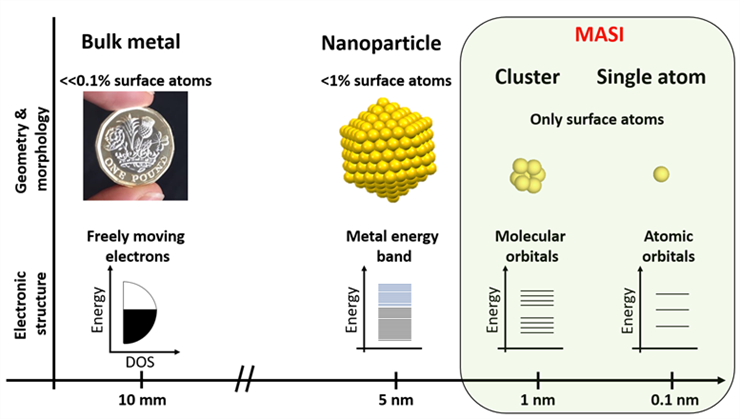
About the MASI programme
MASI tackles some of the most formidable challenges of our time, which cannot be solved by any single research group. This large-scale multidisciplinary project spearheaded by four UK universities, and we utilise our combined expertise in physics (Birmingham) and chemistry of nanoclusters (Nottingham), nanomaterials (Cambridge) and theoretical modelling (Nottingham); heterogeneous catalysis (Cardiff; Nottingham), energy materials and devices (Birmingham, Cambridge) and photo-, electro-, and photoelectrochemistry (Nottingham, Birmingham).
Complementary scientific capabilities are linked across the four institutions to take the science and technology of metals much deeper, down to single metal atoms (SMAs) and sub-nm metal nanoclusters (MNCs), where every atom matters and serves a useful purpose in a catalyst or energy conversion material. Metal nanoclusters are fundamentally different to much better-known metal nanoparticles (diameters >2 nm); in nanoparticles, the majority of metal atoms reman ‘hidden’ within the lattice and are excluded from participation in useful chemistry. In contrast, all or most of the atoms in SMAs/MNCs are fully accessible for physicochemical processes, while new functional properties, inaccessible in bulk metals or in nanoparticles, can emerge as a result of confinement in MNCs.

Our scientific aim is to develop a toolkit, combining innovative experimental and theoretical approaches, that would enable prediction and controlled formation of SMAs/MNCs with atomic precision (size, shape, composition), their bonding, interactions with support materials and reactions with tough-to-crack molecules such as N2 , CO2 or CH4.
The MASI programme grant is funded by 
Follow us on Twitter: